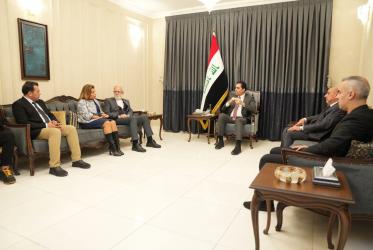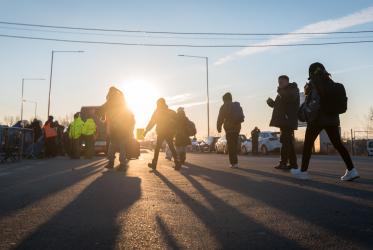I was a stranger and you welcomed me. (Matthew 25:35)
The world is in the midst of an historic crisis of forced displacement – of people obliged to leave their homes, communities and countries to escape conflict, persecution, repression, natural and human-made disasters, ecological degradation, or other situations that endanger their lives, freedom or livelihood.
During 2015, forced displacement due to conflict and persecution surpassed all previous records, exceeding 65 million people – or one out of every 113 people on earth – forced to flee their homes in fear of their lives. Conflicts and insecurity in the Middle East – especially the tragically continuing war in Syria and in parts of Africa - have been major drivers of this exodus.
In the same year, more than a million people crossed the Mediterranean to Europe as refugees and migrants, many putting themselves into the hands of people smugglers, in search of safety and a place to rebuild their lives. More than 3,770 people perished during 2015 in the course of this hazardous crossing, and more than 2,850 more are thought to have been lost already so far this year.
As observed by the WCC executive committee in its June 2015 statement on responses to migrant crises, this global crisis is evident in many different contexts around the world, exemplified not only by the unprecedented numbers of migrants and refugees seeking to cross the Mediterranean Sea to Europe, but also of Rohingya and Bangladeshi migrants on the Andaman Sea, people journeying from Central and South America to the United States, and others.
In Central America, especially in Guatemala, El Salvador and Honduras, the issue of forced migration is connected to rampant corruption, gangs, and ultimately drug trafficking and organized crime. In its latest report on Global Trends the United Nations High Commissioner for Refugees (UNHCR) stated that the number of asylum seekers from countries in the Northern Triangle (Honduras, Guatemala and El Salvador) increased from 20,900 in 2012 to 109,800 in 2015.
These crises have demonstrated that, in today’s world, it is impossible to remain insulated in one’s own safety and comfort from the suffering experienced by such vast numbers of people seeking refuge. Closing one’s eyes and ears to the plight of the victims was never acceptable, and now it is no longer feasible.
In the face of this global crisis of forced displacement, the governments and societies of Europe, North America, Australia and other destinations for these movements of people have found themselves tested on their willingness and capacity to fulfil their obligations and commitments under international law and policy, to human rights, and to basic ethics and morality.
In the countries to which so many desperate people have turned, responses have varied greatly. In some cases, despite obvious logistical difficulties and political challenges, they have received a compassionate welcome. The central committee particularly affirms and celebrates the efforts of communities and of churches to provide help and support to those passing through or arriving in their countries. Churches and specialized ministries, especially through the ACT Alliance, have sought to provide essential humanitarian assistance to affected people in countries of origin, transit and destination. Other church institutions, such as the Churches’ Commission for Migrants in Europe (CCME), have advocated for principled and compassionate responses by governments, societies and churches.
The WCC itself has undertaken solidarity visits to affected countries and to camps for refugees and migrants, has organized forums for exchange and theological reflection among churches (such as the Church Leaders’ Consultation on the European Refugee Crisis, jointly organized by WCC, Evangelical Church in Germany (EKD) and the Evangelical Lutheran Church in Bavaria, on 29 October 2015 in Munich), and cooperated with UN partners UNICEF, UNHCR and UNFPA to convene a major conference on Europe’s Response to the Refugee Crisis, From Origin to Transit, Reception and Refuge, in Geneva on 18-19 January 2016. And together with CCME, the Conference of European Churches (CEC) and the Protestant Church in the Netherlands, WCC co-organized a conference in Lunteren, the Netherlands, on 14-16 June 2016 to examine the impact of the global refugee crisis on Europe, under the theme "Have no fear".
However, all too often, the response by governments and societies of countries in which suffering people have sought safe haven has been one of fear, of rejection and exclusion. All too often, political actors have sought to galvanize public concern and to increase fear for political advantage. All too often, churches have struggled to follow the Christian calling to welcome the stranger.
Moreover, in this context, longstanding and fundamental principles of international humanitarian law have been questioned and undermined, including the right of asylum – the fundamental principle that all people fleeing from conflict and persecution are entitled to seek international protection regardless of nationality, ethnicity, religion, health status or any criterion other than need.
This principle, though ancient in origin, is enshrined in the Universal Declaration of Human Rights 1948, and protected under the Convention Relating to the Status of Refugees 1951 (‘Refugee Convention’) and its 1967 Protocol. Together with the establishment of the UN High Commissioner for Refugees, the Refugee Convention was a collective international response to the suffering of – mostly European – refugees in the aftermath of the Second World War. The principles and obligations defined in international refugee law are just as relevant and necessary in the context of the current global crisis as they were then in the post-World War II European refugee crisis.
The WCC central committee, meeting in Trondheim, Norway, 22-28 June 2016:
- Acknowledges and respects
- the prerogative of sovereign states to define arrangements for the control of their own borders and the conditions of entry and stay, and recognizes the practical and political challenges posed by the numbers of people arriving. But all states must honour the letter and spirit of their obligations under international law, including human rights and refugee law and especially the right of asylum, or risk jeopardizing the very principles and protections defined to respond to such crises and to which all should be entitled. And states receiving refugees should refrain from imposing oppressive and inhumane constraints upon family reunification that cause suffering and impede social integration, such as lengthening waiting periods.
- Acknowledges and understands
- the fear and uncertainty felt by societies, communities and churches in countries receiving large numbers of new arrivals – the fear of loss of security, of culture, of tradition, of identity and of livelihood. But in the midst of fear and uncertainty, as Christians we are called to remember our common humanity, the shared God-given human dignity of all, the ‘Golden Rule’, the mission of caring for orphans and widows in their affliction (James 1:27) and of welcoming the stranger (Matthew 25:35). We are assured by Jesus Christ who calls us to this ministry that we need not be afraid (John 14:27).
- Affirms and commends
- to members churches and partners the WCC executive committee June 2015 statement on responses to migrant crises, the communiqué from the Church Leaders’ Consultation on the European Refugee Crisis, Munich, 29 October 2015, and the "Call for Shared Responsibility and Coordinated Action" issued by the WCC-UN conference on Europe’s Response to the Refugee Crisis, From Origin to Transit, Reception and Refuge, Geneva, 18-19 January 2016, and the June 2016 Lunteren conference statement "Have no fear".
- Reiterates and underlines
- the WCC’s deep concern for the lives of the tens of millions of people forcibly displaced globally who, fleeing from situations of conflict, violence, persecution, oppression, disaster and deprivation, are driven to undertake journeys of desperate risk and danger.
- Stresses
- its support for the principles of international humanitarian and human rights law and for their application in the context of this crisis.
- Urges
- states to refrain from measures that undermine and do not respect their relevant obligations under international refugee and human rights law, especially the right of asylum, and not to abdicate their responsibilities for saving lives and providing protection, or to seek to shift such responsibilities to others, but rather to accept and share these responsibilities through international and regional cooperation and reflect on the true spirit of these laws.
- Calls
- for much greater and more effective international solidarity in responding collectively to this global crisis, especially through the United Nations system and regional bodies, and addressing the entire trajectory of the movement of forcibly displaced refugees and migrants – from points of origin and transit to points of destination.
- Draws attention to
- the forthcoming UN Summit on Refugees and Migrants, 19 September 2016, as an opportunity for collective governmental and non-governmental reflection and recommitment to a principled and effective response to the current crisis.
- Especially calls
- for more concerted and coordinated international action to resolve the root causes of forcible displacement of people, especially the conflicts in Syria and elsewhere in the Middle East, in Libya and elsewhere in Africa, and the situations of extreme oppression and deprivation from which so many people are fleeing.
- Highlights
- the full implementation of the 2030 Agenda for Sustainable Development/Sustainable Development Goals and also welcomes the engagement of the UN International Decade for people of African descent as one key framework for addressing such root causes.
- Encourages
- churches and specialized ministries of the churches in their diaconal and humanitarian response to people on the move, both locally in their own contexts as well as through the international coordination of ACT Alliance.
- Invites
- immediate wider ecumenical support for the efforts of churches and related organizations bearing the heaviest burden of numbers of forcibly displaced persons.
APPROVED




